Associate Professor, Dr. Do Duy Cuong, Director of the Tropical Disease Center, Bach Mai Hospital, said that recently, the Center has received many cases of severe infections in patients with immunodeficiency due to drug abuse.
According to Dr. Cuong, the number of people abusing drugs containing corticosteroids is increasing, typically the elderly with osteoarthritis, but they buy the drugs themselves to use.
 |
| Corticoid abuse causes many consequences to the user's health. |
With bone and joint diseases, many people find that self-bought medicine cures them very quickly, so they like it and take it regularly. When hospitalized, they all suffer from adrenal insufficiency, musculoskeletal damage, and infections with drug-resistant bacteria.
According to experts, patients with infections caused by drug-resistant bacteria are very difficult to treat, require long hospital stays, and require months of care from family members, which is very expensive.
Not long ago, a female patient had the flu but self-treated with fever reducer and corticosteroids (Medrol 16mg/day). Three days later, this patient's condition did not improve, she had a high fever and difficulty breathing, had to use oxygen and then a ventilator.
When admitted to Bach Mai Hospital, this patient's condition was very serious, with continuous high fever, severe septic shock, chest X-ray showing white opacity in both lungs, and a positive rapid influenza B test.
The patient had to be put on a ventilator and had his blood filtered. Bronchial fluid tests showed influenza B with a Staphylococcus aureus infection. The patient quickly became critical and needed emergency ECMO intervention.
After more than 2 months of intensive care, including 37 days on ECMO, nearly 50 days on a ventilator and high-dose oxygen, the female patient was finally able to escape the clutches of death. Although the patient survived, she suffered long-term damage.
According to doctors, corticosteroids are anti-inflammatory drugs but have the side effect of reducing the body's resistance. Abusing this drug in patients with viral infections increases the risk of secondary infections, especially drug-resistant bacteria.
According to Associate Professor, Dr. Do Duy Cuong, in addition to arbitrarily using antibiotics and drugs containing corticosteroids, many people are hospitalized due to staphylococcal infections without knowing it, causing their lives to be in "a life-threatening situation".
That is the case of a 55-year-old female patient in Hai Phong , who was brought to the Tropical Disease Center, Bach Mai Hospital in a state of staphylococcus aureus septicemia after more than 5 months of treatment in many places without success.
Initially, the female patient only had pimples in her private area, pain and a slight fever. She went to a hospital in Hanoi to have the pimples extracted, then used antibiotics to treat them. A few days later, the pimples reappeared next to the old wound, red and swollen, and had a fever. She went to another hospital for examination. This time, she was hospitalized and had surgery to remove all the pus, and was prescribed antibiotics.
Not long after returning home, another small pimple appeared. She continued to seek treatment for nearly 5 months, but the disease persisted, weakening her and making her mentally panic, worried that she had a terminal illness.
When arriving at Bach Mai Hospital, the female patient had a high fever, chills, pus discharge from the anus, and a very severe blood infection. Doctors found the "culprit" causing her illness was cellulitis, blood infection caused by staphylococcus, which was resistant to common antibiotics, causing her to go to many medical facilities but could not be cured. Doctors had to combine many specialties to come up with a treatment regimen with antibiotics that could treat staphylococcus, in order to save the female patient.
Associate Professor, Dr. Do Duy Cuong said that in our country, buying antibiotics is easy, but abusing antibiotics and drugs containing corticosteroids is even easier, causing serious consequences.
Medicines must be used according to the correct indication and dosage. If used indiscriminately, it will reduce the ability to resist and easily lead to multi-drug resistant bacterial infection leading to septic shock and multiple organ failure.
Therefore, doctors recommend that when sick, people should go to a medical facility for examination, get a prescription from a doctor and take medicine as directed, not arbitrarily buy and use medicine, or buy according to an old prescription, or follow the advice of acquaintances, because it will leave unpredictable consequences.
Also regarding the abuse of drugs containing corticosteroids, information from Tam Anh High-Tech Eye Center said that the facility had just received patient Linh (36 years old, Hanoi) with a diagnosis of cataracts, glaucoma in both eyes, and the risk of permanent vision loss due to prolonged use of eye drops containing corticosteroids.
According to the share, Ms. Linh has been using an eye drop of unknown name, opaque white color for about 10 years. The doctor diagnosed Ms. Linh with posterior subcapsular cataract and secondary glaucoma due to long-term use of corticosteroid drugs without proper indication.
The time when I started having blurred vision coincided with the time when I was pregnant and gave birth. I subjectively thought that my blurred vision was due to being tired from taking care of my child, so I did not go to the doctor early, not expecting the condition to be so serious,” Ms. Linh was shocked when she received the doctor’s conclusion.
Associate Professor Bui Thi Van Anh, Head of the Department of Phaco and Anterior Ocular Diseases, Tam Anh High-Tech Eye Center, shared that cataracts are common in people over 50, especially posterior subcapsular cataracts that only appear in patients who have had surgery to replace artificial lenses.
A case like Ms. Linh's is quite rare because the patient is young and has never had any eye surgery before. The cause was determined to be the prolonged use of eye drops containing corticosteroids, which causes cataracts and glaucoma to appear earlier in young people.
According to Associate Professor Van Anh, cataracts and glaucoma tend to worsen, and patients will gradually lose their vision and ability to see if they do not receive treatment.
Ms. Linh needs to have her lens replaced soon (phaco surgery) to restore her vision and use medication to reduce eye pressure and limit the progression of glaucoma.
After three days, the patient's intraocular pressure stabilized within a safe range. Ms. Linh was indicated for phaco surgery. Phaco is a highly safe surgery, the doctor removes the cloudy natural lens and replaces it with an IOL lens, thereby restoring the patient's vision. In Ms. Linh's case, she had a history of high intraocular pressure and damaged optic nerve, making phaco surgery more complicated.
Ms. Linh had the lens replaced in each eye in two consecutive days, each surgery only lasting 7 minutes. The result was that vision was restored, clear, and eye pressure was reduced. However, the patient was still prescribed medication and regular follow-up to control and prevent the glaucoma from progressing.
Associate Professor Van Anh said that many people have the habit of using eye drops to clean and increase moisture for their eyes but do not research and look up the ingredients of the medicine, and arbitrarily buy the medicine without medical instructions. Corticoid is an ingredient used a lot in modern medicine, which has the effect of reducing many disease symptoms.
Corticoid eye drops have the effect of quickly reducing pain, anti-inflammation and constricting blood vessels, but should be used with caution and under the direction of a doctor. Drug abuse causes many serious complications, affecting vision: increased eye pressure, cataracts as in Ms. Linh's case.
Symptoms of eye diseases are quite vague in the early stages, so everyone should have regular eye exams to check and evaluate eye health, or have re-examinations as prescribed by the doctor in case of eye disease treatment or underlying diseases affecting the eyes such as cardiovascular disease, diabetes.
When you see signs of blurred vision or distorted vision, you should see an eye specialist for timely diagnosis and intervention, Associate Professor Van Anh recommends.
People using eye medications containing corticosteroids should be aware of some side effects of the medication such as stinging in the eye area, strange taste in the mouth, swelling of the tongue - lips - mouth, and unusual rashes on the body.








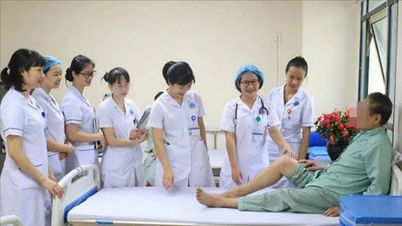

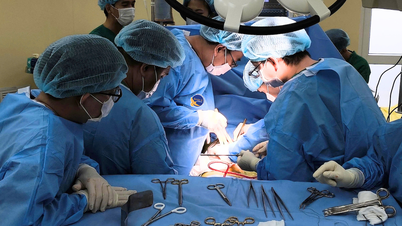

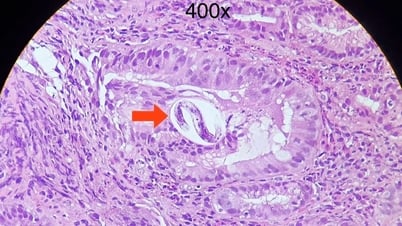





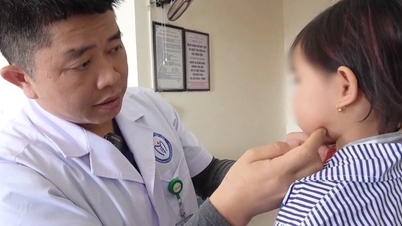

























































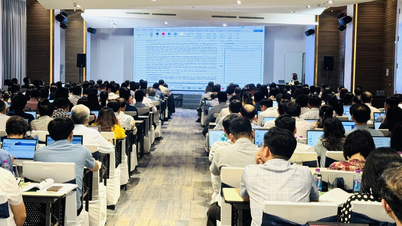


















Comment (0)